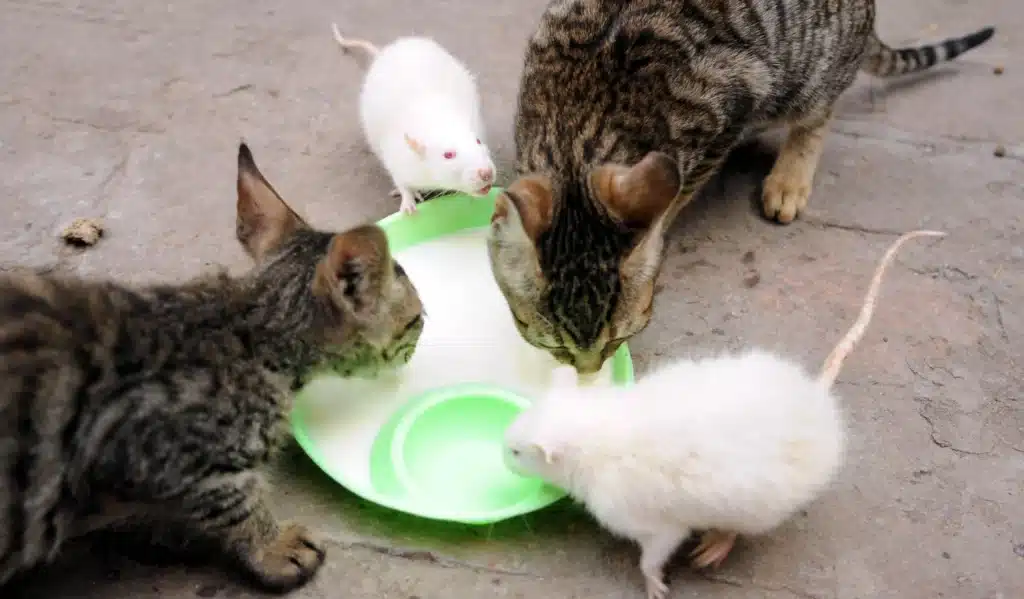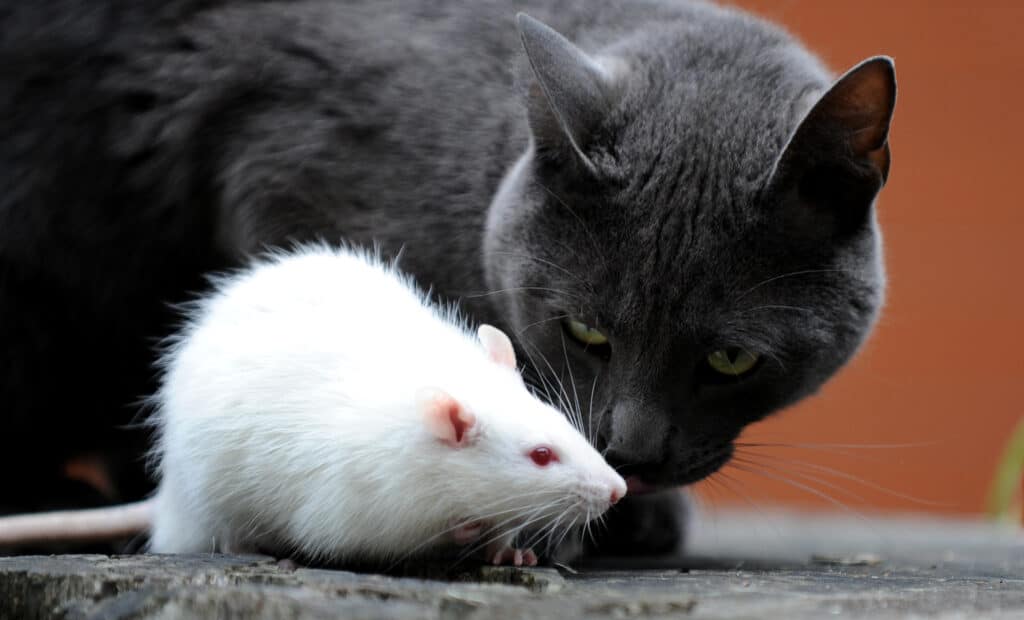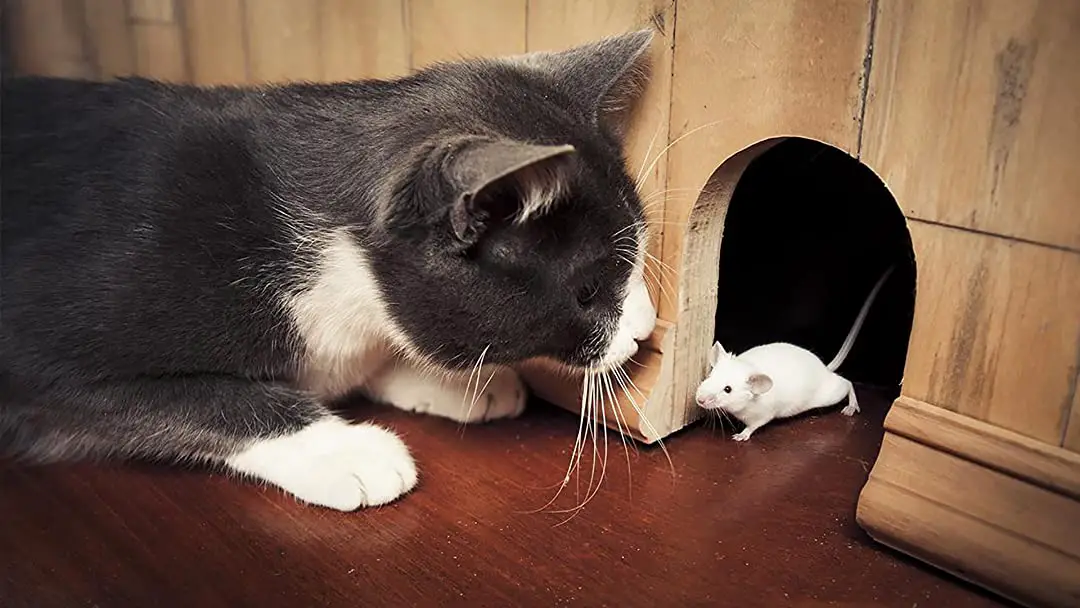Introduction
Can Cats Smell Mice: Certainly! Cats are well-known for their remarkable sense of smell and their innate ability to detect the presence of mice and other rodents. This extraordinary olfactory sense is a crucial aspect of their predatory nature and has been honed over millions of years of evolution.
The olfactory system of cats is highly developed, featuring around 200 million scent receptors in their noses, compared to the mere 5 million in humans. This gives them an incredible advantage in detecting even the faintest odors, including those emitted by mice. Cats possess a specialized scent-detecting organ called the Jacobson’s organ, or the vomeronasal organ, which helps them analyze and process pheromones and other scent cues.
Mice and other small rodents produce various scent molecules as they move, mark their territory, and interact with their environment. Cats food can pick up on these scent cues, often imperceptible to humans, and use them to track down the whereabouts of potential prey. This exceptional ability to detect the scent of mice allows cats to exhibit their natural hunting behaviors, making them efficient and skilled predators.

Will mice stay away if they smell a cat?
Does Cat Scent Keep Mice Away? The cat scent, whether it is from hair, urine, or saliva, deters mice. So cat scent may help to keep mice away from your home. Mice can also see cat hair easily and they do not like to go around cats.
The Predator-Prey Relationship
Cats are natural predators, and their presence alone can send shivers down the spines of mice. Mice have evolved to recognize the scent of a cat as a sign of danger, triggering their fight-or-flight response. This is because cats are known to be skilled hunters, and mice have adapted to perceive their scent as a potential threat. As a result, the scent of a cat can evoke fear in mice, influencing their behavior and movement patterns.
Scent Marking and Communication
Cats, like many animals, use scent marking as a form of communication. They have scent glands on various parts of their bodies, and they deposit scent markers in their territories to establish dominance and mark boundaries. When a cat’s scent is detected in an area, mice may interpret it as a signal that the area is under feline control, leading them to avoid those spaces to reduce the risk of encountering a predator.
Limited Impact on Chronic Infestations
While the presence of a cat’s scent can influence mice behavior in the short term, its effect may diminish over time, especially in cases of chronic infestations. Mice are known for their adaptability, and they can become accustomed to certain scents if they perceive that the immediate threat is not substantial. In such situations, the initial deterrent effect of the cat’s scent might wane, and mice could gradually become bolder in exploring the territory despite the potential danger.
Other Factors Influencing Mouse Behavior
While the smell of a cat can certainly impact mice behavior, it is important to acknowledge that it’s not the only factor at play. Availability of food, shelter, and other environmental conditions also strongly influence mice behavior and movement patterns. If a location offers abundant food and safe hiding places, mice might still venture into the area despite the presence of a cat’s scent.
How do cats act when they smell mice?
Pacing and Pouncing —One of the most obvious ways your cat tells you there is an intruder is when they are trying to hunt them down. For example, if you see your cat sniffing and pacing around your kitchen cabinets you may have a mouse behind them!
Heightened Alertness:The moment a cat detects the scent of a mouse, their senses go into overdrive. Their ears perk up, and their eyes dilate as they focus on pinpointing the source of the scent. Cats are known for their exceptional ability to sense movements and changes in their environment, making them finely tuned to the presence of potential prey.
Stalking and Pouncing:Cats are natural-born hunters, and the scent of a mouse triggers their instinct to stalk and pounce. They’ll begin to move slowly and stealthily, following the scent trail while maintaining a low profile. This behavior mimics the stalking process they would employ in the wild when hunting small animals.
Tail Twitching:As cats get closer to the source of the mouse scent, you might notice their tail twitching or swishing. This behavior is a sign of their intense concentration and excitement. The tail movement helps them maintain balance and coordination as they prepare for a potential pounce.
Crouching:When a cat believes they’re getting closer to the mouse or when they’ve located it, they might crouch down close to the ground. This position allows them to remain hidden from their prey until the perfect moment to strike.
Can a cat smell where a mouse has been?
Cats have a superior sense of smell that helps them detect rodents present in the home. It is about 14 times stronger than humans. They utilize their 200 million odor sensors in the nose to sniff out the mice’s musky odor and nest. These pets also use their 24 whiskers to sense vibrations and motions near them.
Acute Olfactory Receptors:Cats possess an impressive number of olfactory receptors in their noses, estimated to be around 200 million compared to humans’ mere 5 million. These receptors are sensitive to a wide range of scents, enabling cats to pick up on even faint odors left behind by other animals.
Scents as Storytellers:A cat’s sense of smell is so powerful that it can effectively “read” the environment through scents. When a mouse moves through an area, it leaves behind a trail of pheromones, urine, and other scent markers. To a cat, this trail is like a story, revealing information about the mouse’s presence, movement, and even emotional state.
Scent Marking and Detection:Cats are territorial animals that use scent marking as a form of communication. They deposit their own scent markers on objects and areas to claim their territory. When a cat smells where a mouse has been, they’re essentially reading the “message” left behind by the mouse’s scent markers, providing them with valuable information about the intruder in their domain.
Following the Trail:Cats possess a specialized organ called the Jacobson’s organ, or the vomeronasal organ, located on the roof of their mouth. This organ is responsible for processing pheromones and other chemical signals. When a cat detects a strong scent trail left by a mouse, they might open their mouths slightly and curl back their lips in a behavior known as the Flehmen response. This action helps them direct more scent molecules to the Jacobson’s organ, allowing them to analyze the scent in even greater detail.
Do mice avoid houses with cats?
A study conducted by the University of Florida found that mice were often found in homes with cats. The rodents may not be as active to avoid drawing the attention of the cat, but they were still often present. Interestingly, the study found that mice were less likely to be present in homes that had both cats and dogs.
The Predator-Prey Dynamic:
Cats are known for their hunting prowess, and mice are a staple in their diet in the wild. The scent of a cat alone can evoke fear in mice due to their evolutionary adaptation to recognize the presence of predators. This has led to the assumption that mice would naturally avoid areas where cats are present, including households.
Initial Deterrence:The scent of a cat does indeed have a short-term deterrent effect on mice. When mice detect the scent of a cat, they are more likely to exhibit cautious behaviors and avoid areas that carry the scent. However, this response might not be a foolproof method to keep mice away in the long run.
Adaptation and Habituation:Mice are incredibly adaptable creatures. If they perceive that the immediate threat posed by a cat is minimal or if they are accustomed to the scent due to prolonged exposure, their fear response might diminish over time. In cases of chronic infestations, mice might become bolder and more willing to explore areas where cat scent is present.
Alternative Factors Influencing Behavior:While the scent of a cat can influence mice behavior to some extent, it is just one factor among many. Mice are primarily driven by their need for food, water, and shelter. If a house provides ample resources and safe hiding places, mice might still be motivated to enter even if the scent of a cat is present.
Limitations of Natural Deterrence:Relying solely on the presence of a cat to deter mice might not be a comprehensive solution. It’s important to remember that not all cats have the same hunting instincts, and some may not actively chase or catch mice. Additionally, some mice may become desensitized to the scent of a cat if they do not perceive an immediate threat.
Are mice afraid of cats?
Mice know that cats can smell them when they enter their house. Cats emit chemicals that scare mice away from home because these chemicals are found in the saliva of their pets and trigger sensory organs in mice that spread fear and terror.
Predator-Prey Relationship:Cats are natural predators, and their presence evokes primal fear in many smaller animals, including mice. This fear response is an evolutionary adaptation that helps prey animals survive in the wild. Mice have evolved to recognize the scent and visual cues of cats as potential threats, prompting them to adopt evasive behaviors to avoid becoming prey.
Scent of Fear:The scent of a cat can elicit a heightened fear response in mice even before direct interaction occurs. When mice detect the scent of a cat, they often freeze, reduce their activity, and remain vigilant. This behavior stems from their instinct to minimize the risk of detection by a potential predator.
Stealth and Caution:The fear of cats influences how mice move through their environment. They become more cautious, utilizing cover and shadows to their advantage. Mice may change their travel patterns, focusing on areas that appear safer from the perspective of potential predators, such as cats.
Behavioral Adaptations:Mice demonstrate remarkable behavioral adaptations in response to the presence of cats. They might change their feeding patterns, seek shelter in higher places or burrows, and even change their reproductive behaviors to mitigate the risk of being detected by their feline adversaries.
Limitations of Fear:While the fear of cats is a powerful instinct for mice, it is not an absolute deterrent. In environments where cats are constantly present, mice may become habituated to the scent over time, potentially reducing the intensity of their fear response. Additionally, individual mice may vary in their sensitivity to cat scents, leading to differences in behavior.
Can mice sense a cat in the house?
Mice also have a keen sense of smell and can identify a cat even when they do not see it. When this is the case, they can often move throughout a home undetected by a cat. It is also important to take the personality of a cat into consideration.
Ultrasounds and Auditory Perception:Cats are known for their ability to emit high-pitched ultrasonic vocalizations that are inaudible to humans but are within the hearing range of mice. These vocalizations, which are often produced during hunting or territorial behaviors, can serve as a warning signal for mice. The presence of ultrasonic sounds may prompt mice to retreat to safer areas within the house.
Visual Cues and Body Language:Even in the absence of direct visual contact, mice are highly sensitive to visual cues and body language. The mere sight of a cat’s silhouette or movement might trigger an immediate fear response in mice. This heightened awareness of their surroundings helps mice detect the presence of a cat and adjust their behavior accordingly.
Stress and Behavior Changes:The presence of a cat in the house can induce stress in mice, leading to observable changes in their behavior. Mice may become more cautious, exhibit hyper-vigilance, and reduce their activity levels. This adaptive behavior is an attempt to minimize the risk of encountering the predator and to increase their chances of survival.
Contextual Factors:The effectiveness of mice in sensing a cat in the house can be influenced by contextual factors. The familiarity of the scent, the visibility of the cat, and the overall environment play a role in determining how mice react to the presence of a feline predator.
What smell do mice hate?
As it turns out, there are several smells that these pests cannot stand, which means you can use them to your advantage. But what exactly do mice and rats hate to smell? Mice can be kept away by using the smells of peppermint oil, cinnamon, vinegar, citronella, ammonia, bleach, and mothballs.
Peppermint:
Peppermint is often touted as a natural mouse repellent due to its strong and pungent scent. The essential oil derived from peppermint leaves emits a fragrance that mice find unpleasant. Placing cotton balls soaked in peppermint oil near potential entry points or nesting areas may deter mice from those areas. However, the effectiveness of peppermint as a repellent can vary, as some mice may eventually become accustomed to the scent.
Mothballs:
Mothballs, which contain naphthalene or paradichlorobenzene, are known for their strong odor. While they might discourage mice from certain areas, it’s important to note that mothballs can be toxic to both humans and pets. Their use should be approached with caution, and safer alternatives should be considered.
Ammonia:
Ammonia is another scent believed to repel mice. Soaked rags or cotton balls dipped in ammonia can be placed in areas where mice are likely to frequent. However, ammonia has a strong and pungent odor that can be overpowering for humans as well, so proper ventilation is necessary.
Cayenne Pepper:
Cayenne pepper or hot pepper flakes have a strong and spicy aroma that mice may find disagreeable. Sprinkling cayenne pepper in areas where mice are active could potentially deter them. However, it’s important to be cautious when using this method, as the pepper could irritate human skin and eyes.
Essential Oils:
Aside from peppermint, other essential oils such as eucalyptus, cinnamon, and citronella are often believed to have mouse-repelling properties. These oils can be diluted with water and sprayed in areas of concern. However, the effectiveness of essential oils can vary, and they might need to be reapplied frequently.
How do I scare mice out of my room?
Mice don’t like the smell of garlic, onions, cayenne pepper, cloves, ammonia and alcohol. If you don’t want to be driven out your home by unpleasant smells either, peppermint is another scent that repels mice.
Create a Hostile Environment:
Mice are attracted to food, water, and shelter. Remove these attractions to discourage their presence. Store food in airtight containers, clean up crumbs, fix any water leaks, and declutter areas that provide hiding spots. By eliminating potential food and water sources, you create an environment that is less appealing to mice.
Seal Entry Points:
Inspect your room for any cracks, gaps, or openings that mice can use to enter. Seal these entry points with steel wool, caulk, or other suitable materials. Pay attention to areas around windows, doors, pipes, and vents. Blocking off their access routes is a critical step in preventing future infestations.
Use Repellents:
Employing natural repellents can encourage mice to leave your room. Peppermint oil, which is known for its strong scent that mice dislike, can be applied to cotton balls and strategically placed near potential entry points or nesting areas. However, remember that mice can become accustomed to scents over time, so it might not be a long-term solution.
Make Noise and Light:
Mice are nocturnal creatures and prefer quiet and dark environments. Disrupt their comfort by introducing noise and light. Leave a radio playing or turn on bright lights during the night. These disruptions can make mice uncomfortable and encourage them to seek quieter, darker locations.
Use Traps:
Live traps can be effective tools for catching and removing mice from your room. These traps capture mice without causing harm, allowing you to release them outdoors. Bait the traps with peanut butter or small bits of cheese, and place them along known mouse pathways or near potential entry points.

Conclusion
A cat’s remarkable ability to smell mice is a testament to their finely tuned senses and evolutionary adaptation as skilled predators. Their highly developed olfactory system, featuring an abundance of scent receptors and specialized organs like the Jacobson’s organ, allows them to detect even the faintest scent cues produced by mice and other rodents. This keen sense of smell is an essential tool in their hunting toolkit, enabling them to track, stalk, and capture their prey with impressive accuracy.
Cats’ olfactory prowess is further enhanced by their acute hearing and sharp vision, creating a comprehensive sensory package that equips them for successful hunting. The combination of these senses gives cats a competitive edge in the animal kingdom, making them efficient and effective hunters of mice and other small rodents. As natural predators, cats’ ability to smell mice not only satisfies their innate instincts but also showcases the fascinating ways in which animals have adapted to their environments over millennia.





No Comments